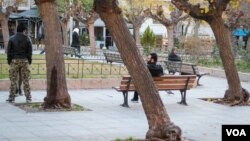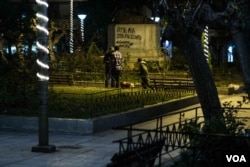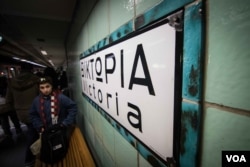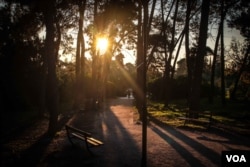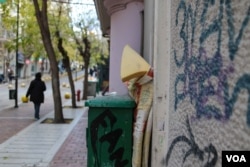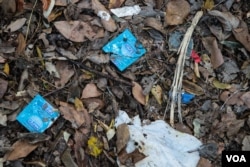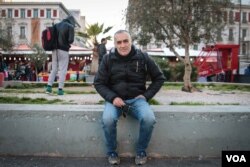‘I’m like your uncle,’ the old man reassured brothers Ali, 17, and Ahmad, 16, before pressing a 20 euro note into Ahmad’s palm.
The boys had only just arrived in the Greek capital of Athens, having fled Afghanistan and their father’s murderers, the Taliban, but they had not fully escaped danger.
The second time they met the man, a week later, he had company - and the brothers narrowly escaped abduction.
In Greece, reports of young, unaccompanied refugees and migrants being lured into prostitution are on the rise.
These reports are symptomatic of a broader failing as unaccompanied minors continue to fall through gaps in the Greek asylum process.
No family, no money
Ali and Ahmad arrived in a central part of Athens called Victoria Square, a well-known meeting point for refugees.
Like thousands of others who had undertaken grueling journeys without adult accompaniment to reach Europe, they found themselves in a strange city with no help and little idea of what to do next.
“We went to Victoria because we didn’t know where else to go and we thought someone could help us,” said Ali.
“At first we thought this man was very kind.”
He wasn’t. The second encounter - a demand for the money to be repaid, followed by a failed attempt to snatch the youngsters - is typical of the tactics used to induce vulnerable young refugees into the sex trade, said social worker Tassos Smetopoulos.
Since around 60,000 refugees and migrants became trapped in Greece by the closure of borders last spring, Victoria Square and nearby Pedion tou Areos park have become known as places where young men and teenage boys sell themselves for sex to make money.
“There was prostitution among migrant men [in the area] before the refugee crisis,” explained Smetopoulos, “but with the refugee crisis they have got younger and increased in numbers.”
Clients - often elderly Greek men - will offer a small payment and sometimes a place to stay and shower to boys as young as 15.
Increasingly desperate for money and keen to escape Greece, some are venturing into this world alone. Others, said Smetopoulos, are being entrapped.
“I see them, men and boys” explained 18-year-old Muhammed Ansari, an Afghan who was waiting for friends at Victoria Square.
“They have come to me and I’ve said no. But the boys have no family, and no money.”
Going 'off radar'
Despite an identification process that is supposed to occur upon arrival in Greece, some unaccompanied minors are failing to be identified and protected.
Others have chosen to remain "off-radar" in the hope it will help their efforts to move on elsewhere in Europe - a journey made illegal by border closures, save for a formal process of relocation that has sped up in recent months but remains painfully slow.
The broader problem was highlighted last year when Europol - the EU’s criminal intelligence agency - estimated that 10,000 unaccompanied child refugees had ‘disappeared’ since arriving in Europe.
“Some, especially young boys, are fragile and open to suggestion,” said the Salvation Army’s Maria Konti-Galinou, who works extensively with refugees vulnerable to sexual exploitation around central Athens.
“They want to raise some money to reach the countries where their families are,” added Galinou, who explained that a small number of refugee women were also becoming entrapped in the nearby red light district.
“It’s like someone is dying and you’ll get the vultures coming out.”
According to figures from the U.N. agency assisting refugees, of 2,300 unaccompanied minors in Greece only 1,300 are being provided with ‘shelter or adequate accommodation’.
Unlike others, brothers Ali and Ahmad now have a safe place to stay.
They fled from the gang to the offices of Praksis, an NGO that provides accommodation tailored towards unaccompanied minors.
Praksis did not comment specifically on Ali and Ahmad’s incident, but in an email to VOA it stated that for some men and unaccompanied minors living outside shelters due to a lack of beds “things have already escalated to a level that sex working or survival sex has become their everyday life.”
Estimates unavailable
Despite its severity, the scale of the problem remains ill-defined.
While acknowledging the issue, Praksis stated that even “estimates regarding this vulnerable population are not available.”
A spokesman for the Greek government stated that the police were collaborating with NGOs and partner organizations and receiving specialist training to help address the trafficking and sexual exploitation of vulnerable minors.
The spokesman added that, as of the end of December, police had received no reports of such cases of recruitment “aiming at sexual exploitation” of minors.
Yet having seen the trade himself from his cafe overlooking Victoria Square, Vasilis Kakomanolis questioned efforts to address the problem.
“If everyone here knows about this, then surely the police do?” he asked, rhetorically.
Following their ordeal, Ali and Ahmad now try to avoid Victoria Square for fear of bumping into the men who tried to abduct them. One day, Ali hopes, he will emulate his father and become a dentist.
But as Afghan boys in Europe, a place ever less welcoming to even the most vulnerable refugees, their future remains opaque.
For Smetopoulos, it is not just the authorities and NGOs in Greece that are falling short, it is the international community as a whole.
“These vulnerable boys need to be given a chance,” he said. “You need to treat children as children.”
Note: The names of Ali and Ahmad have been changed to protect their identity.




